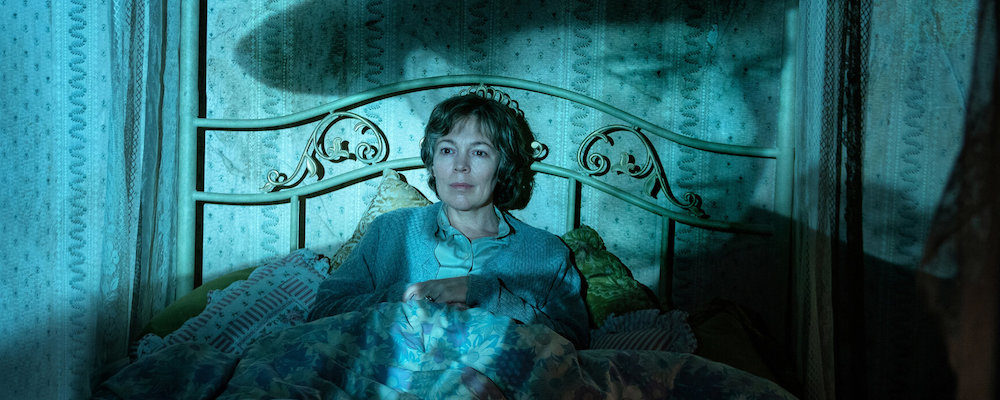Olivia Colman and David Thewlis Are ‘Landscapers’ Both Murderous and Tragic
Alci Rengifo
HBO’s limited series “Landscapers” understands the human tragedy beneath all true crime. Most actual tales of murder lack anything particularly flashy or grand. Many involve tortured, lonely souls who might have simply faded away had they not committed something atrocious. This series is especially more about the personalities than the act. In 2013 Susan Edwards and husband Christopher were linked to the murder of Susan’s parents when their bodies were found buried outside a flat in Mansfield, England. Olivia Colman and David Thewlis perfectly embody mundane people sucked into a horrible vortex. They play the Edwards without malice, like a loveable couple who stumbled towards murder. By the end of this four-part series we might not fully comprehend them, which can be said about so many infamous people.
When the series opens Susan and Christopher are living in France and sinking into financial troubles. Christopher, a former accountant, is struggling to find work especially due to the fear that possible employers will call his connections in England for background checks. Susan is mostly at home spending money they don’t have on movie memorabilia. When a phone call results in Christopher’s stepmother tipping off the Mansfield police about the disappearance of Susan’s parents in 1998, the Edwards decide to surrender. They cross back into England where they are interrogated, primarily by two detectives, played by Kate O’Flynn and Samuel Anderson. While the two confess to having buried Susan’s parents in a garden, the motives are beyond hazy. Details emerge of a couple tied together by fragile psyches, who saw in each other mutual rescue from their sad existences. Were the murders a response to abusive situations, a convenient way to get money, or a mix of both?
“Landscapers” is easily billed as true crime but its approach differs a lot from the usual movies or docuseries in the genre. Director Will Sharpe doesn’t go for grit but for an experimental, almost surreal aesthetic. In the story part of what unites Susan and Christopher is a shared love for movies. They adore French actor Gérard Depardieu and write him letters. They never travel except to the local theater. Sharpe creates psychological landscapes where the couple envision themselves in movie scenarios, edited like ‘70s nightmares or ‘40s heroic fantasies. The final episode of the series literally turns into a Western. These are quirky personalities and Sharpe captures the sadness of feeling entrapped, while escaping into daydreams. As the couple tells the detectives some of their background stories, we can see why movies filled such a void. Out on a date, Susan panics if she’s out too late because she’s maintained the same routine with her parents since childhood. Her home sounds like a pressure cooker with parents who nag, fight and drink too much. Susan later reveals she was sexually abused by her father as a child. For Christopher it was his chance to love and also genuinely help someone.
It isn’t that the screenplay by Ed Sinclair attempts to turn the Edwards into heroes, far from it. This is one of those true crime stories like Richard Linklater’s “Bernie,” where Jack Black plays another seemingly harmless soul who somehow crosses the red line into murder. Olivia Colman and David Thewlis, two of the greatest actors around, generate a challenging kind of empathy. Both create Susan and Christopher as the kind of people who were never vicious enough for this world and have a reserved, almost frightened demeanor. They are indeed perfect for each other and had they never killed anyone could have lived a relatively comfortable existence living together and going to the movies. There’s nothing wrong with not being the cutthroat go-getters. But that sort of person can also be trapped by other factors, like an overbearing home or scars that never healed. We are glued to watching Colman and Thewlis’ performances because of the sheer human tragedy in their cries, breakdowns and desperate attempts to invent alibis. There’s not much of a “clear motive” by the end, only clear actions, because the motives can be as archaic as a mix of desperation for freedom meets access to easy money. Susan’s parents were unbearable, the father was possibly a monster, and snuffing them out while collecting their checks seemed like liberation.
“Landscapers” is another Peak TV example of sharp directing combined with awards-worthy performances. Yet it could have worked just as well if it were cut down to a good, tight movie. The rhythm can get a bit repetitive in some sections, even as they are punctuated by brilliant set pieces like a sequence in the third episode where the detectives get close to the truth through surreal, theatrical re-creations of the crime. It’s a powerful way of evoking the idea of Susan being forced to witness what she and Christopher carried out. Psychologically the material is richer than the average TV murder mystery. Susan and Christopher are not demented serial killers or grand bank robbers. Pathetically enough, they had turned themselves in after spending most of the money they acquired on movie memorabilia. These are haunted souls and with Colman and Thewlis they become unforgettable.
“Landscapers” premieres Dec. 6 and airs Mondays at 9 p.m. ET on HBO.

